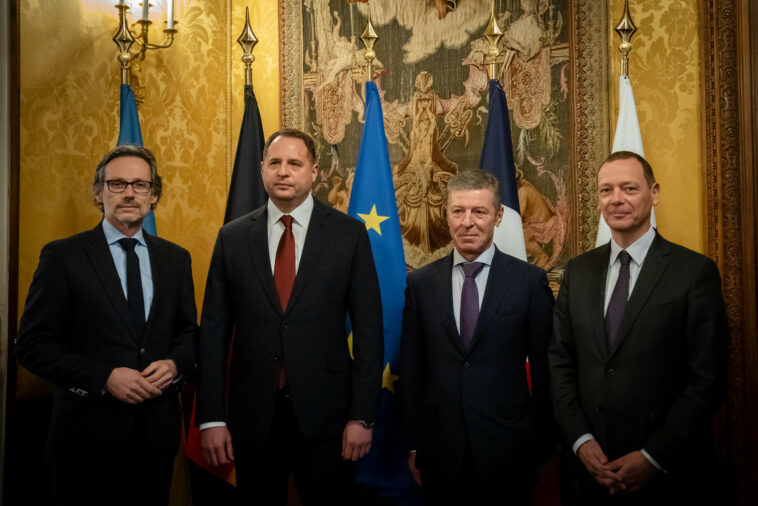On Wednesday January 26, advisors to leaders of Germany, France, Ukraine, and Russia, a grouping known as the Normandy Four, met in Paris amid fears of a renewed Russian invasion of Ukraine. Andriy Yermak, Head of the Presidential Office attended on behalf of Ukraine.
The meeting that came after a long pause marked a “revival of the Normandy format,” Yermak said. Yet there are concerns that the Normandy partners could prompt Ukraine to make concessions in the face of a threat of Russia’s aggression. Here’s what we know about the meeting.
The meeting lasted longer than scheduled. Advisors to the four heads of state – Andriy Yermak, Dmitry Kozak, Emmanuel Bonne, and Jens Plötner talked for eight hours behind closed doors. They made no breakthrough, their public comments after the meeting suggest.
Remarks by Yermak. The group issued a declaration and agreed to meet in Berlin two weeks later. The sides agreed that the ceasefire in Donbas has to hold unconditionally, Yermak said.
“Ukraine and Russia admitted they have disagreements over the Minsk agreements, but said they are willing to work on them. The next meeting will be in Berlin in two weeks. We agreed to continue the talks,” Yermak said.
He did not provide further details. Generally the ceasefire holds, but there are minor violations at times, the Chief of Staff to the Ukrainian President said.
He stressed the importance of maintaining a ceasefire against the backdrop of heightened tensions on Ukraine’s border.
“The declaration we adopted today is the first since December 2019,” he said.
Remarks by Russia’s envoy. The meeting was “complex” and aimed to “revise different views of the Minsk agreements”, said Dmitry Kozak, deputy head of the administration of the Russian President. The sides agreed to meet in Berlin after domestic consultations. He also confirmed the ceasefire arrangements.
“We agreed that the ceasefire has to hold unconditionally despite the disagreements over the Minsk agreements,” Kozak said.
He said Ukraine and the so-called separatist republics were fully responsible for a ceasefire. Russia is not a party to the conflict in Donbas, he said.
On Thursday, Ukraine’s Joint Forces recorded a violation of the Minsk agreements. “On the frontline in Luhansk region, service members of a mechanized brigade of the Ukrainian Armed Forces spotted a hostile subversive group as it tried to enter the area. The group retreated to the temporarily occupied territory,” a report by the Joint Forces command reads.
In Ukraine, all eyes on talks. In Ukraine, all eyes were on the meeting, despite no hopes for a breakthrough.
First, ahead of the meeting, the Western media quoting anonymous sources said Ukraine could be pushed to hold direct talks with the leaders of the occupied territories in Donbas.
The reports were met with anger in Ukraine. Kyiv has been firm in its posture that direct talks with the militants would give them legitimacy.
Meanwhile Russia and the militants it backs continue to insist on having direct talks between the Ukrainian government and the so-called separatists in Donetsk and Luhansk. Ahead of his departure to Paris, Andriy Yermak disproved those reports.
“We have not held direct talks with the separatists, and we will not hold them,” he said in a comment to RBC Ukraine. The advisors to the leaders of the Normandy Quad did not have a clear agenda, he added.
Ukraine was determined to discuss a ceasefire, humanitarian efforts, opening of the crossings, and the prospect of the Normandy Four’s work, he added.
Second, Russia demanded that Ukraine recalls a bill on the transitional period for the occupied territories ahead of the meeting. The government recalled it. The Office of the President denied that. “The bill cements de-occupation of the uncontrolled territories and dissolution of occupational administrations. Under the bill, a ‘direct dialogue’ is impossible, so is the co-existence of the Ukrainian and self-proclaimed administrations. That is critical for Moscow,” political analyst Maria Zolkina explains in a column for EuroPravda.
Talks that end with no progress play into Russia’s hands, Zolkina says. Russia will present them as an act of good will in a standoff with the U.S. “Russia will ‘trade’ to the West the Paris meeting of the advisors, its formal support to a ceasefire, and an agreement on a new meeting in Berlin as de-escalation and a constructive change in its posture. That’s a smart bet. Russia holds a meeting with no progress, and gets a concession by Ukraine. Strategically that is more beneficial than making a step back in its demands for the U.S. and NATO, or withdrawing the troops from the Western border. Moscow did nothing, but got a right to claim ‘good intentions’ at the talks with Washington,” Zolkina said.




